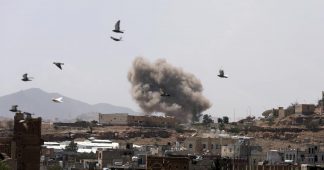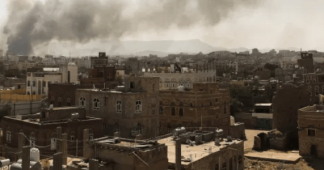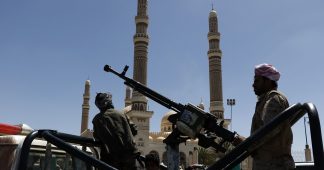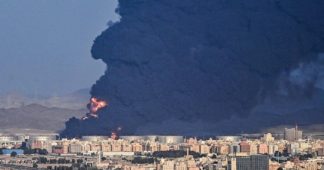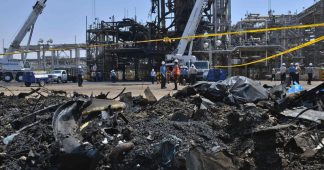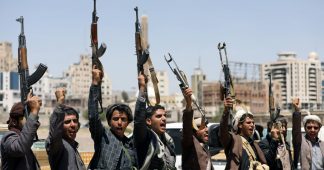By Mohammed Ghobari and Alaa Swilam
ADEN (Reuters) -The warring sides in Yemen’s seven-year conflict have for the first time in years agreed a nationwide truce, which would also allow fuel imports into Houthi-held areas and some flights operating from Sanaa airport, the U.N. envoy said on Friday.
The U.N.-brokered deal between a Saudi-led coalition and the Houthi group aligned with Iran is the most significant step yet towards ending a conflict that has killed tens of thousands and pushed millions into hunger. The last coordinated cessation of hostilities nationwide was during peace talks in 2016.
U.N. special envoy Hans Grundberg said the two-month truce would come into effect on Saturday at 7 p.m. local time (1600 GMT) and could be renewed with consent of the parties. Saturday marks the start of the Muslim holy month of Ramadan.
“The aim of this Truce is to give Yemenis a necessary break from violence, relief from the humanitarian suffering and most importantly hope that an end to this conflict is possible,” Grundberg said in a statement, adding he would press for a permanent ceasefire
Yemen’s economy and basic services including health have collapsed, leaving 80% of the population of around 30 million reliant on aid.
U.N. Secretary-General Antonio Guterres said the truce “must be a first step to ending Yemen’s devastating war”, urging the parties to build on the opportunity to “resume an inclusive and comprehensive Yemeni political process”.
The deal stipulates halting offensive military operations, including cross-border attacks, and allowing fuel ships to enter Houthi-held Hodeidah port and commercial flights in and out of the airport in the capital, Sanaa, “to predetermined destinations in the region”.
Grundberg said the parties agreed to discuss opening roads in Taiz, effectively under siege, and other Yemeni regions.
The U.N and U.S. envoys had been trying since last year to engineer a permanent truce needed to revive stalled political negotiations. The Houthis wanted the coalition blockade lifted first, while the alliance sought a simultaneous deal.
The conflict is seen as a proxy war between Sunni Muslim Saudi Arabia and Shi’ite Iran. Riyadh has struggled to extricate itself and Yemen has been a point of tension with Washington.
The Houthis recently intensified missile and drones strikes on the kingdom, including its oil facilities, and the coalition ramped up air strikes.
The Yemeni government, which the Houthis ousted from Sanaa in late 2014, said earlier it would facilitate arrangements for release of prisoners, opening Sanaa airport and allowing fuel vessels into Hodeidah.
“We immediately announce the release of the first two fuel ships through Hodeidah port,” said Foreign Minister Ahmed Bin Mubarak.
Houthi chief negotiator Mohammed Abdulsalam welcomed the truce. Another senior official, Mohammed Ali al-Houthi, said its “credibility would be in implementation”.
A copy of the truce deal seen by Reuters, and reported by Houthi-run Al Masirah TV, said 18 fuel vessels would be given access during the truce period and two flights a week would be operated from Sanaa to Jordan and Egypt.
The Saudi-led coalition also welcomed on Friday the truce in Yemen saying it supports the U.N. efforts and arrangements to keep the deal, Saudi state TV reported.
The Saudi-led coalition, which intervened in March 2015 against the Houthis, controls Yemen’s seas and air space.
U.S. President Joe Biden welcomed the truce but said it must be adhered to and he urged negotiators to “undertake the hard and necessary work” to reach an enduring peace.
The parties are also discussing a prisoner swap under which hundreds from both sides would be freed, including 16 Saudis, three Sudanese and a brother of Yemen’s president.
The last major prisoner swap, involving around 1,000 detainees, took place in 2020 as part of confidence-building steps agreed at the last peace talks held in December 2018.
(Reporting by Alaa Swilam in Cairo, Mohammed Ghobari in Aden and Aziz El Yaakoubi in RiyadhAdditional reporting by Michelle Nichols;Writing by Saeed Azhar and Ghaida GhantousEditing by Frances Kerry and Alistair Bell)
Published atwww.usnews.com
We remind our readers that publication of articles on our site does not mean that we agree with what is written. Our policy is to publish anything which we consider of interest, so as to assist our readers in forming their opinions. Sometimes we even publish articles with which we totally disagree, since we believe it is important for our readers to be informed on as wide a spectrum of views as possible.
